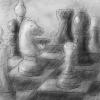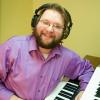There is one very important part of learning to compose better that hasn't been mentioned here yet - ear training/aural skills. By practicing this skill you will be able to recognize the elements of music much better, whether in a piece of music you're listening to or an original composition in your head. The notes will begin to come easily to you, so when your thinking of a melodic line, harmony, texture, etc., you won't have to spend time figuring exactly what notes are. Instead, you will be able to write them down right away as naturally as you would for writing text. There is software intended to help develop this skill, such as GNU Solfege and the exercises on http://www.teoria.com
Learning how to compose (better)
There is one very important part of learning to compose better that hasn't been mentioned here yet - ear training/aural skills.
Actually listening (ear training/aural skills) has been mentioned quite a bit. I think many have been suggesting taking a theory-based knowledge of music and then listening to be able to best identify what it is the song's doing to capture one's attention. It's not enough to just listen, you must listen critically. This doesn't make anything you've said wrong or anything, but I wanted to point out several folks have suggested this as a very useful, if not vital, step in learning how to be a better composer.
Thanks!
Nate
Actually listening (ear training/aural skills) has been mentioned quite a bit.
Perhaps I wasn't clear in what I meant about aural skills. Yes, people have suggested listening to pieces of music and figuring out what the artist is doing, but what I meant was practicing the more fundamental aspects of aural skills - such as identifying intervals and dictating melodies into notation by ear alone. These exercises may seem very dry and boring to practice, but they are essential for becoming a better composer.
Great ideas in this thread! Thanks everyone!
Personally, I like to listen to my favorite composers and write down a score or put it into DAW. This is a great way to learn harmonic rules and see how professionals build up tension. If someone better did it before you there is no reason to reinvent the wheel ![]()
BTW. Reading books like: Rimsky-Korsakov "Principles Of Orchestration" may be also helpful.
Edit: Sorry, made some mistakes ;)
Perhaps I wasn't clear in what I meant about aural skills. Yes, people have suggested listening to pieces of music and figuring out what the artist is doing, but what I meant was practicing the more fundamental aspects of aural skills - such as identifying intervals and dictating melodies into notation by ear alone. These exercises may seem very dry and boring to practice, but they are essential for becoming a better composer.
Ah, I see the disconnect now. Perhaps it was unique to my schools but, during both undergrad and graduate work, music theory was always both a mental and aural exercise. It was never only one. For example a prof could say "C up to an F is a perfect fourth. It sounds like so." then he would play it on the piano. Then he would drill us on which intervals were a perfect fourth. Once the class got it, he'd move on. My professors would do this with all sorts of intervals and chords.
So... for me and my background, learning music theory was actually doing both. And that's how it should be, in my opinion. Perhaps someone teaching themselves would split things up... but even in my private lessons with my piano students, it's always focused on both mental and aural. It would seem very incomplete to just read a book or research intervals and do zero aural training with those studies. Almost like reading a book on programming but doing zero programming exercises. :P
There is one very important part of learning to compose better that hasn't been mentioned here yet - ear training/aural skills. By practicing this skill you will be able to recognize the elements of music much better, whether in a piece of music you're listening to or an original composition in your head. The notes will begin to come easily to you, so when your thinking of a melodic line, harmony, texture, etc., you won't have to spend time figuring exactly what notes are. Instead, you will be able to write them down right away as naturally as you would for writing text. There is software intended to help develop this skill, such as GNU Solfege and the exercises on http://www.teoria.com
That's great advise. We used a program called MacGamut in my theory class (though we had a different name for it). But a great free resource out there is musictheory.net. There's some great exercises in both basic theory and aural skills.
Love the responses in this thread. It jives with what my mentors have always told me. "everything is borrowed" "don't be afraid to sound really bad for a moment or two if it means learning what to do or more importantly, what not to do" It's also a good idea to stop and look at your current musical vocab and think of new clever ways yo use what you know already. After all some of the best songs in the world are just 3 chords with a exciting or emotional melody over it. Just a tip that I have to remind myself about from time to time.






